Home Tags Posts tagged with "house arrest"
house arrest
Alexei Navalny and more than 100 other demonstrators have been arrested at a rally in central Moscow, activists say.
The Russian opposition leader had urged protesters to gather in Manezh Square near the Kremlin after his brother, Oleg Navalny, was sentenced to jail.
Police detained Alexei Navalny at the protest and took him home, where he has been under house arrest since February.
Alexei Navalny says the legal cases against him and his brother are motivated by his opposition to President Vladimir Putin.
Hours earlier, a court in Moscow handed Alexei Navalny a suspended prison sentence of three-and-a-half years for defrauding two firms. His brother Oleg was given a three-and-a-half-year custodial sentence for the same offence.
Alexei Navalny accused authorities of trying to punish him by jailing his brother, and called for his supporters to gather in central Moscow in protest.
Around 2,000 people gathered in temperatures below -10C.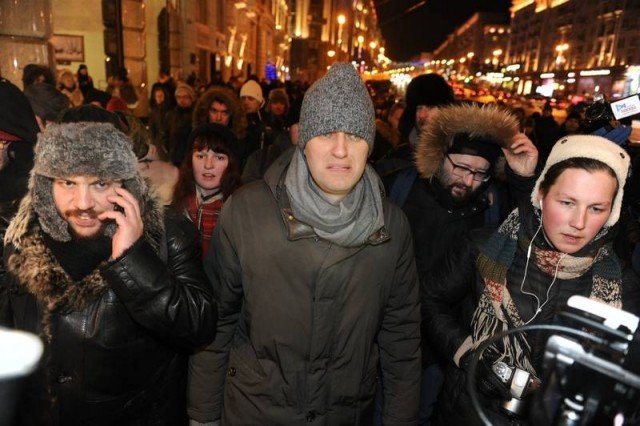
Pro-government protesters are staging a counter-demonstration nearby.
At least 171 people were detained by police said OVD Info, a campaign group that monitors political detentions. However there was no official confirmation of the number of arrests.
Upon arriving at the rally, police detained Alexei Navalny and drove him to his house in a police van.
He said he was not allowed out of his flat and that five soldiers stood guard outside.
After his arrest, Alexei Navalny sent a tweet saying that he “had not got as far as the square”.
“I call on everyone not to leave until they are forced to,” he said.
“They cannot arrest everyone.”
Just before his arrest, Alexei Navalny told reporters that his motivation was “not my brother, my family, myself or some specific people” but “this disgusting outrage that has been going for many years”.
Prosecutors had demanded 10 years in prison for Alexei Navalny and eight years for his brother Oleg.
Alexei Navalny has been under house arrest since February as part of a separate five-year suspended sentence for the alleged theft of 16 million rubles from a timber firm in 2009.
[youtube iOtBQUKly0o 650]
Hosni Mubarak has appeared in court, three days after being released from prison and placed under house arrest.
The former Egyptian president is facing a retrial on charges of complicity in the killing of protesters during the 2011 uprising.
Hosni Mubarak sat in the defendants’ cage along with his two sons, former interior minister, and six security chiefs.
Earlier, the separate trial of the Muslim Brotherhood’s general guide and his two deputies was adjourned.
The court convened briefly and made its decision because Mohammed Badie, Khairat al-Shater and Rashad Bayoumi were absent for security reasons.
Their presence was requested for the trial’s resumption on October 29.
The Brotherhood leaders face charges of inciting the murder of protesters who stormed the Islamist movement’s headquarters in Cairo on 30 June as millions took to the streets demanding the resignation of Hosni Mubarak’s democratically elected successor, Mohamed Morsi.
Mohamed Morsi was deposed by the military three days later.

Hosni Mubarak has appeared in court, three days after being released from prison and placed under house arrest
He is being detained while prosecutors investigate allegations related to his escape from prison during the uprising that forced Hosni Mubarak from power, including that he conspired with the Palestinian militant group Hamas.
On Sunday, Hosni Mubarak, 85, appeared in the dock inside the high-security courtroom at the police academy on the eastern outskirts of Cairo sitting in a wheelchair, wearing a white tracksuit and dark sunglasses.
He was reportedly flown by helicopter to the court from a military hospital where he has been held under house arrest since his release from prison on Thursday. The hearing has been adjourned until September 14.
Hosni Mubarak was sentenced to life in prison in June 2012 after being found guilty of complicity in the killing of hundreds of protesters. His former interior minister, Habib al-Adly, also received a life sentence, but the security chiefs were acquitted.
The former president and his sons, Alaa and Gamal, were cleared of separate charges of corruption relating to a gas export deal at the same trial because of the statute of limitations.
In January 2013, the Court of Cassation accepted appeals against their convictions by Hosni Mubarak and Habib al-Adly and ordered a retrial of all the defendants. Their supporters had noted that the original trial judge had said there was no evidence linking Hosni Mubarak to the shooting of protesters.
Their retrial began in May but it has been repeatedly adjourned for various reasons, prompting claims from pro-democracy activists and representatives of the victims that the judges and defense team were dragging out proceedings to avoid a verdict.
On Thursday, Hosni Mubarak was moved from a prison cell to house arrest at the hospital in Maadi, ending more than two years of incarceration.
It came a day after a court ruled that he could no longer be detained in relation to a separate corruption case that alleges he accepted gifts from the state-run publisher, al-Ahram. He has already served the maximum time allowed in custody in connection to the complicity case.
Under President Mohamed Morsi, state prosecutors brought new charges when courts ordered Hosni Mubarak’s release to ensure he was kept in detention. Alaa and Gamal Mubarak are being held on multiple corruption charges.
[youtube QD8vE76Cq84]
Efrain Rios Montt, Guatemala’s former military leader, has had his conviction for genocide and crimes against humanity overturned.
The constitutional court said the trial must go back to where it stood on April 19 and restart from that point.
On May 10, General Efrain Rios Montt, 86, was convicted of ordering the deaths of 1,771 people of the Ixil Maya ethnic group during his time in office in 1982-83.
He was sentenced to 80 years in prison. The former leader denies the charges.
The constitutional court on Monday threw out all proceedings in the case after the April day when there was a dispute between two judges about who should hear the case.
The ruling follows an appeal by Gen. Efrain Rios Montt’s defense lawyers, who argued that procedural errors had been committed.
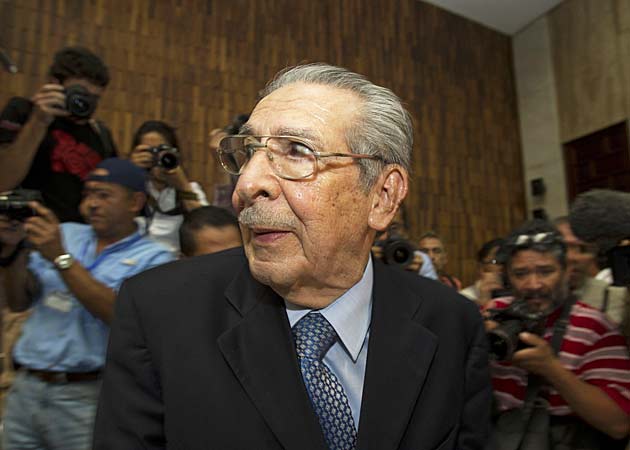
Efrain Rios Montt, Guatemala’s former military leader, has had his conviction for genocide and crimes against humanity overturned.
The trial – which began in March – was beset by delays and even a temporary suspension.
During the hearings, dozens of victims gave harrowing testimony about atrocities committed by soldiers.
Gen. Efrain Rios Montt became the first former leader to be found guilty of genocide by a national tribunal in May.
Now, just days later, the jubilant scenes among indigenous campaigners in a packed court were contrasted sharply with the low-key press conference in which this latest legal twist was announced.
The decision to annul the sentence does not signal the end of the legal battle either for the prosecution or for Efrain Rios Montt as both sides will now start preparing to return to court to replay the final few weeks of the trial.
An estimated 200,000 people were killed in Guatemala’s 1960-1996 civil war, the vast majority of them indigenous Mayans.
Efrain Rios Montt’s 17 months in power are believed to have been one of the most violent periods of the war.
The former general abandoned politics in 2012, after serving in Congress for a number of years.
Efrain Rios Montt is now expected to leave the military hospital where he is currently being held and return to his home under house arrest.
[youtube mTOSTAFKe9Y]
Robel Phillipos, friend of the Boston Marathon bombing suspect Dzhokhar Tsarnaev who is accused of lying to FBI investigators, will be released on bail with house arrest, a federal judge has ruled today.
American citizen Robel Phillipos, 19, is to be freed on a $100,000 bond provided he wears an electronic monitoring bracelet and is confined to his home.
He and two other friends of Dzhokhar Tsarnaev were charged last week with hindering the investigation.
Robel Phillipos faces up to eight years in prison if convicted.
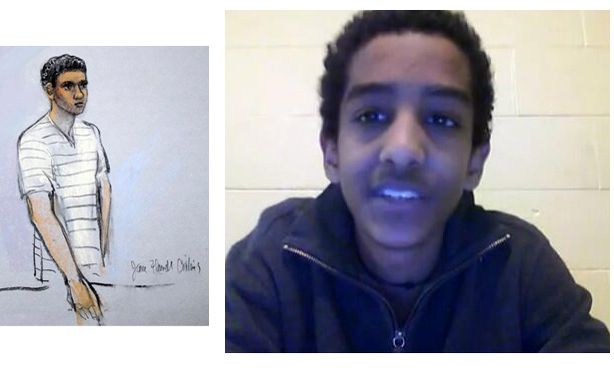
Robel Phillipos, friend of the Boston Marathon bombing suspect Dzhokhar Tsarnaev, will be released on bail with house arrest
He is accused of lying to investigators about visiting Dzhokhar Tsarnaev’s dormitory at the University of Massachusetts-Dartmouth on April 18, three days after the bombings.
Azamat Tazhayakov and Dias Kadyrbayev, two other college friends, have been charged with conspiring to obstruct justice by taking a backpack with the remains of fireworks and a laptop from Dzhokhar Tsarnaev’s dorm room before the FBI searched it.
None of the three men are implicated in the planning of the bombings.
In court documents, defense attorneys for Robel Phillipos said their client had nothing to do with the attack and was not a flight risk.
According to a resume filed with the court, Robel Phillipos was studying marketing and sociology at the University of Massachusetts-Dartmouth, and was expected to graduate in 2015.
But the university has said he was not enrolled during the current semester.
In letters filed with the court, friends and family members described Robel Phillipos as peaceful and non-violent.
“I do not believe that my beloved Robel crosses the line intentionally to support or assist such a horrendous act against us the people of the USA,” his aunt, Zewditu Alemu, wrote.
“By nature he does not like violence.”
[youtube MU0ZQrriBZ8]
Pakistan’s former military ruler Pervez Musharraf has been remanded in judicial custody for two weeks over claims he illegally detained judges in 2007.
Pervez Musharraf, who ruled Pakistan between 1999 and 2007, was arrested on Friday.
The High Court ruled that the allegations amounted to an act of terrorism and ordered him to appear at Islamabad’s anti-terror court.
Pervez Musharraf has described the case against him as politically motivated.
Last month Pervez Musharraf returned from years of self-imposed exile hoping to lead his All Pakistan Muslim League (APML) party into the general election next month.
However, the former prersident has so far failed in his bid to register as a candidate with election officials.
Pervez Musharraf’s lawyers said it was unclear whether he would be detained under house arrest, in policy custody, or in jail.

Pervez Musharraf has been remanded in judicial custody for two weeks over claims he illegally detained judges in 2007
APML spokesman Muhammad Amjad said Pervez Musharraf would fight the allegations in a higher court.
Judges are determined to prosecute Pervez Musharraf over his decision to dismiss judges including Chief Justice Mohammad Iftikhar Chaudhry.
Pervez Musharraf is accused of keeping the judges under house arrest for about six months in 2007 after he imposed emergency rule.
The former leader was brought to the court under heavy security.
Angry lawyers reportedly shouted slogans calling for Pervez Musharraf to be tried for treason.
His supporters and opponents clashed inside and outside the court.
Pervez Musharraf faces several other criminal cases and had been trying to stave off arrest since he returned.
The Pakistani Taliban have also vowed to assassinate former president Pervez Musharraf, who seized power in a 1999 coup.
[youtube QSYEJWw_Rdk]
Former Pakistani military ruler Pervez Musharraf has been arrested and will be held under house arrest in Islamabad for two days.
Earlier, TV images showed Pervez Musharraf entering a district court amid heavy security.
On Thursday a Pakistani court ordered the former leader’s arrest over an attempt to impose house arrest on judges in March 2007.
It was an unprecedented move against a former army chief who ruled the country for almost a decade.
Although Pervez Musharraf was present at court on Thursday when the warrant was issued, police made no attempt to arrest him and he rapidly returned to his home on the outskirts of the city.
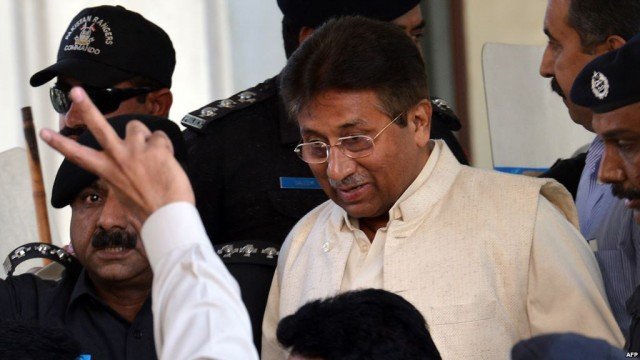
Pervez Musharraf has been arrested and will be held under house arrest in Islamabad for two days
On Friday morning, according to his aides, Pervez Musharraf went to a district court escorted by his security detail and submitted himself for arrest to comply with Thursday’s court order.
Police said the arrest had taken place overnight at his home.
Pervez Musharraf’s legal team say they will challenge the arrest order in Pakistan’s Supreme Court.
Last month Pervez Musharraf returned from years of self-imposed exile hoping to lead his All Pakistan Muslim League (APML) party into the general election next month.
Earlier this week his candidacy was rejected in Chitral, one of four seats he had applied to contest.
Pervez Musharraf had already failed in an attempt to stand in three other seats.
The case for which the former military ruler has been arrested relates to his controversial decision to dismiss judges – including Chief Justice Mohammad Iftikhar Chaudhry – when he imposed emergency rule in 2007.
Pervez Musharraf also faces several other criminal cases and had been trying to stave off arrest ever since he returned.
The Pakistani Taliban have also vowed to assassinate former President Pervez Musharraf, who seized power in a 1999 coup.
[youtube HPogxukGIGs]
[youtube DPh0v7A8W4U]
Chinese dissident Chen Guangcheng, who was at the centre of a diplomatic crisis with Washington, is on his way to the United States.
The blind activist and his family boarded a flight to Newark, near New York, after being taken from a Beijing hospital to the capital’s airport.
Chen Guangcheng recently spent six days in the US embassy in Beijing after escaping house arrest in north-east China.
He has been offered a fellowship at New York University.
Chen Guangcheng, a self-taught lawyer who campaigned against forced abortions under China’s one-child policy, was jailed for four years in 2006 for disrupting traffic and damaging property, and placed under house arrest after his release in 2010.
Earlier on Saturday, Chen Guangcheng was picked up from the hospital where he was being treated for a foot injury and taken to Beijing airport, along with his wife and two children.
At the airport they were handed passports and allowed to leave. He boarded flight UA88 to Newark, New Jersey, which departed at 17:50, more than two hours late.
“Thousands of thoughts are surging to my mind,” Chen Guangcheng told the Associated Press news agency from the terminal.
Referring to his supporters, he said: “I am requesting a leave of absence, and I hope that they will understand.”
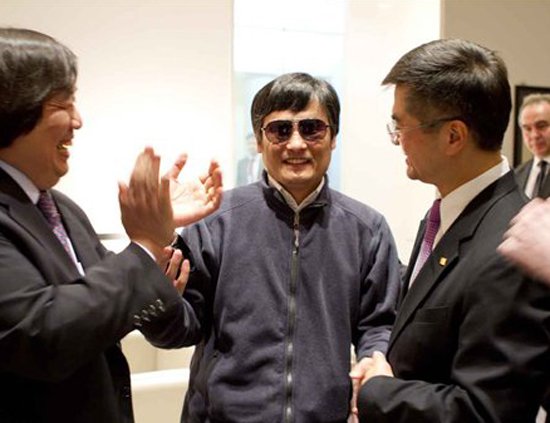
Chinese dissident Chen Guangcheng, who was at the centre of a diplomatic crisis with Washington, is on his way to the United States
The state-run Xinhua news agency said Chen Guangcheng had applied to study abroad “via normal channels in line with the law”.
US state department spokeswoman Victoria Nuland said the administration was looking forward to welcoming Chen Guangcheng to the US, and expressed “appreciation for the manner in which we were able to resolve this matter”.
Bob Fu, president of the US activist group China Aid and a key supporter of Chen Guangcheng, said the dissident was planning to stay in New York for two to three years.
“Of course he wants to spend some time to rest after seven years of brutal treatments at the hands of the Chinese local authorities,” Bob Fu said.
With the activist on his way, both China and the US will want to put this extraordinary diplomatic dispute behind them.
Last month Chen Guangcheng fled from house arrest in Shandong province.
According to media accounts, the blind activist climbed over the wall of the property with the help of his wife late at night.
When he landed on the other side he broke his foot. He is then said to have felt his way in the dark, stumbling and falling, to a nearby village when a friend took him into his home.
He was then driven hundreds of kilometres away to the American embassy. He took refuge there during a visit by US Secretary of State Hillary Clinton, who was in Beijing for high-level talks.
On 2 May, after six days at the embassy, Chen Guangcheng agreed to leave the compound, initially saying he wanted to stay in China.
He was taken to hospital for treatment. During his stay there he called the US Congress twice.
On 3 May Chen Guangcheng pleaded for help to leave China with his family, saying he feared for his safety, and on 16 May he called again, accusing Shandong authorities of harassing his family.
Chen Guangcheng was offered a place to study law at New York University after Beijing said he would be allowed to apply to study abroad.
The US has said visas for Chen Guangcheng and his family are ready.
However the activist has repeatedly warned that his friends and relatives could face reprisals once he has left.
Chinese dissident Chen Guangcheng says he and his family have completed passport applications and officials say they should be ready within 15 days.
The blind activist said officials had helped him fill in the forms on Wednesday at the Beijing hospital where he is staying.
Chen Guangcheng spent six days in the US embassy last month after escaping house arrest.
He wants to leave China and has been offered a place at a US university.
Chen Guangcheng left the US embassy after six days to seek medical treatment but then said that he wanted to go to the US because he feared for his safety.
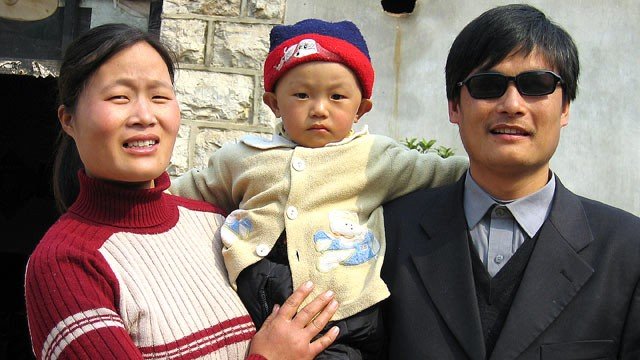
Chen Guangcheng says he and his family have completed passport applications and officials say they should be ready within 15 days
Amid a diplomatic crisis between the US and China over his fate, Chen Guangcheng was offered a place to study law at New York University after Beijing said he would be allowed to apply to study abroad.
The US says the visas for Chen Guangcheng and his family are ready.
Chen Guangcheng said government officials came to see him on Wednesday and completed passport applications for him, his wife and their two children.
He said the officials told him the passport would take 15 days to issue, without giving a definite date.
“People from the immigration administration department have been here. We had our pictures taken and forms filled out. [They said] within 15 days,” Chen Guangcheng said.
“They didn’t promise when we’ll get the passport. They didn’t say anything like we will definitely get the passport on a certain day, etc. There was nothing like that told to us,” he added.
He said he was well, but said doctors had told him he still should not walk because of the foot injury he sustained escaping from house arrest.
Chen Guangcheng and his family are living in the hospital room, and his wife said she was not allowed to leave the hospital freely.
On Tuesday Chen Guangcheng accused local Chinese authorities of harassing his family in his hometown of Dongshigu village, as he spoke via telephone to a US congressional committee.
His nephew, Chen Kegui, has been charged with “intentional homicide” in the wake of Chen Guangcheng’s escape to Beijing.
Liu Weiguo, the lawyer for Chen Kegui, said last week his client was acting in self-defense when he injured three people – none of them critically – who broke into his house on 27 April.
Chen Guangcheng, a self-taught lawyer who campaigned against forced abortions under China’s one-child policy, was himself jailed for four years in 2006 for disrupting traffic and damaging property, and placed under house arrest after his release in 2010.
China says activist Chen Guangcheng can apply to study abroad, potentially indicating a way out of the diplomatic crisis with the US over him.
A Chinese foreign ministry statement said Chen Guangcheng could “apply through normal channels in accordance with the law”.
The blind dissident fled house arrest last month and spent six days inside the US embassy. He left the embassy but now says he wants to go to the US with his family.
His case has overshadowed high-level US-China talks taking place in Beijing.
“If he wishes to study overseas, as a Chinese citizen, he can, like any other Chinese citizens, process relevant procedures with relevant departments through normal channels in accordance to the law,” Xinhua news agency quoted spokesman Liu Weimin as saying
Earlier, China had demanded an apology from the US for sheltering Chen Guangcheng in its embassy.
Despite the apparent change of heart from the government, one human rights lawyer told the Reuters news agency that Chen Guangcheng could still be delayed or prevented from leaving the country.
“This notice from the Ministry of Foreign Affairs is positive news, but how it will play out we don’t know,” Tang Jitian told Reuters.
“For instance, getting the approval for the paperwork to go – there are many potential pitfalls. We can’t be 100% optimistic.”
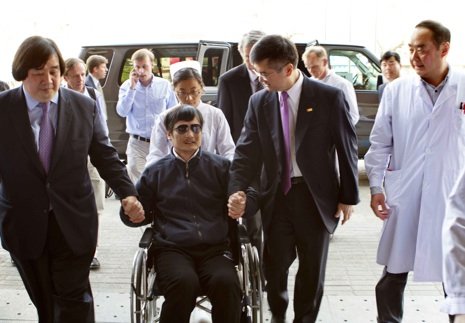
China says activist Chen Guangcheng can apply to study abroad, potentially indicating a way out of the diplomatic crisis with the US over him
Chen Guangcheng is currently in a Beijing hospital, sealed off by Chinese police. US officials have so far failed to see him.
The deputy head of mission at the US embassy to Beijing was seen arriving at the hospital carrying gifts. He met Chen Guangcheng’s wife Yuan Weijing but was prevented from meeting the dissident himself.
He has been trying to gain access to Chen Guangcheng’s room. The building was ringed by police who prevented as well as lawyers and diplomats, from seeing the dissident.
On Thursday, Chen Guangcheng telephoned a US Congressional hearing in Washington DC, saying he feared for the safety of his family and wanted to meet visiting US Secretary of State Hillary Clinton face to face.
Speaking ahead of a meeting on Friday with President Hu Jintao, Hillary Clinton said the relationship was “stronger than it’s ever been”.
“We have developed a very open and honest relationship where we can discuss our differences, and we remain committed to bridging those differences whenever and wherever possible,” she said.
A joint US-China news conference is expected later in the day.
Chen Guangcheng said he had changed his mind about staying in China because he believed Beijing had reneged on an agreement to guarantee his safety.
There is no official confirmation of any such agreement, but media reports from the US suggest that Chen Guangcheng had been promised safety in a university town in China.
Chen Guangcheng, 40, is a lawyer who has campaigned against forced abortions and sterilizations of women under China’s policy of one child per family.
He told the Associated Press news agency his phone calls to American officials “keep getting cut off after two sentences”.
The activist also told AP his wife was being followed and filmed by unidentified men whenever she was allowed to leave the hospital. And he said one of his friends was taken away by state agents and beaten after he tried to visit Chen Guangcheng.
The case has increasing political resonance in the US, where Republican presidential candidate Mitt Romney criticized the administration of President Barack Obama.
Mitt Romney said that if reports that US officials had persuaded Chen Guangcheng to leave the embassy were true, “this is a dark day for freedom and it’s a day of shame for the Obama administration”.
The Beijing Daily, one of China’s main official newspapers, said Chen Guangcheng was an American pawn and criticized US ambassador Gary Locke as a “backpack-wearing, Starbucks-sipping troublemaker”.
Gary Locke caused a stir in China last year when he was seen carrying his own backpack and ordering his own coffee at Seattle airport, in contrast to Chinese officials who usually travel with an entourage.
[youtube UCgqwAIo7oU]
Chinese activist Chen Guangcheng says he has been unable to meet US officials to discuss his desire to leave the country.
The blind dissident, in hospital in Beijing, says he believes Chinese officials were preventing US envoys from visiting him on Thursday.
After he escaped house arrest last week, Chen Guangcheng spent six days in the US embassy before emerging on Wednesday.
The issue continues to overshadow key talks between the US and China.
US Secretary of State Hillary Clinton is in Beijing to attend talks focusing on North Korea and Syria.
As the talks opened, Hillary Clinton did not mention Chen Guangcheng by name but addressed the topic of human rights.
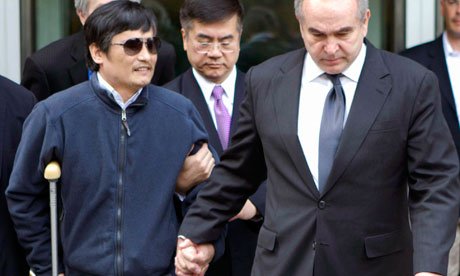
Chinese activist Chen Guangcheng says he has been unable to meet US officials to discuss his desire to leave the country
Earlier, the US ambassador to China, Gary Locke, rejected the suggestion that Chen Guangcheng had been pressured into leaving the US embassy.
“I can tell you unequivocally that he was never pressured to leave. He was excited and eager about leaving,” he said.
However, Chen Guangcheng says since he left he has been made aware of threats made to his wife and family while he was in the embassy.
“She told me our house has been installed with seven CCTV cameras inside the courtyard. There are people in and outside of our house and on the roof…They just eat and stay in our house, and they plan to build up electric wires around my house,” he said.
Although he initially said he wanted to stay in China, Chen Guangcheng changed his mind because he believes China has reneged on an agreement to guarantee his safety.
There is no official confirmation about the nature of any such agreement, but media reports from the US suggest that Chen Guangcheng had been promised safety in a university town elsewhere in China.
Chen Guangcheng also said that US officials had been to the hospital where he is currently receiving treatment, but he had not seen them. He believes Chinese foreign ministry officials are not letting them in.
“Yesterday afternoon I thought they [US officials ] left. I looked for them, but couldn’t find them…Today I got to know that they were prevented from coming in, not that they are not coming in,” he said.
A Chinese foreign ministry spokesman said he had “no information” on Chen Guangcheng’s request to leave China.
Both Hillary Clinton and US Treasury Secretary Timothy Geithner are attending the annual two-day talks, which had been expected to focus on North Korea and Syria.
Hillary Clinton has previously expressed her support for Chen Guangcheng, who has been held under house arrest for almost two years.
As the talks opened, she addressed the topic of human rights.
“The United States believes that no state can legitimately deny the universal rights that belong to every human being – or punish those who exercise them,” the top US diplomat said.
President Hu Jintao, also speaking at the start of the talks, said it was not possible for China and the US to see “eye to eye on every issue”.
Chinese officials on Wednesday accused the US of interference in their domestic affairs and demanded an apology for housing Chen Guangcheng at the embassy.
Chen Guangcheng had been at the US embassy for almost a week after escaping from house arrest in his home village in the eastern province of Shandong.
He had planned his escape from house arrest for months. On 27 April, he scaled the wall the authorities had built around his house and was then driven hundreds of miles to Beijing.
The activist spent seven years in prison or under house arrest after he exposed human rights abuses, including the way thousands of women were forced to have abortions under China’s “one-child-policy”.
Several people involved in Chen Guangcheng’s escape have been detained or have disappeared in recent days.
New reports say Chinese authorities have begun to round up relatives and associates of blind activist Chen Guangcheng, who fled from house arrest last week.
Several people involved in Chen Guangcheng’s escape have been detained or have disappeared in recent days, and fellow activist Hu Jia is being questioned.
Chen Guangcheng, 41, is believed to be sheltering at the US embassy in Beijing.
The US and international rights groups have frequently expressed alarm at the treatment of Chen Guangcheng and his family.
US Secretary of State Hillary Clinton, who has demanded his release in the past, is due in China this week for a previously arranged meeting which is now likely to be overshadowed by Chen Guangcheng’s case.
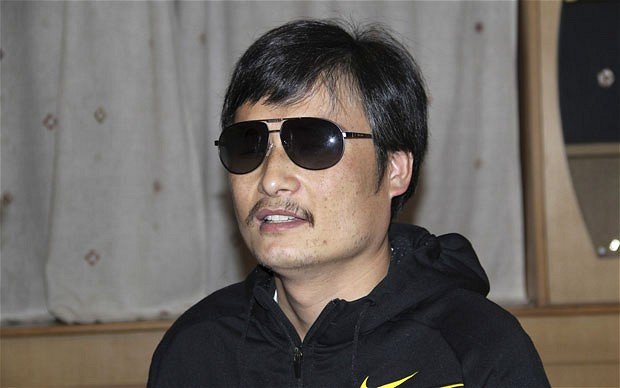
Chinese authorities have begun to round up relatives and associates of blind activist Chen Guangcheng, who fled from house arrest last week
The US government has not so far commented publicly on the whereabouts of Chen Guangcheng.
Analysts say the issue will be highly sensitive for both sides, and will not be easy to resolve.
If Chen Guangcheng is in the embassy, his case will raise memories of an incident in 1989 when another prominent activist, Fang Lizhi, fled to the US mission in Beijing.
He remained there for more than a year while the two sides attempted to broker a deal.
Chen Guangcheng was placed under house arrest in 2010 after spending more than four years in jail for disrupting traffic and damaging property.
He had exposed how local authorities in Linyi, Shandong province, forced thousands of women to have abortions or be sterilized as part of China’s one-child policy.
His colleagues said last Sunday’s escape had taken months to plan, and was carried out with the help of a network of friends and activists.
Chen Guangcheng scaled the wall that the authorities had built around his house, and was driven hundreds of miles to Beijing, where activists say he stayed in safe-houses before fleeing to the embassy.
His wife and six-year-old daughter remain under house arrest, but several of his family members have been detained and others are being sought by the authorities.
One of Chen Guangcheng’s friends, He Peirong – who wrote on her microblog that she had driven him to Beijing – is believed to have been detained in the city of Nanjing.
“I was actually talking to her and the last words she said were <<the PSB [Public Security Bureau] has arrived>>,” said Bob Fu, of the US-based ChinaAid pressure group.
He Peirong’s microblog was later deleted, and all searches on popular microblogging sites for Chen Guangcheng’s name and other related terms were being blocked by the censors.
On Saturday, the authorities detained Hu Jia, who had earlier said how he had met Chen Guangcheng since his escape.
Hu Jia’s wife, Zeng Jinyan, said late on Saturday that her husband’s detention had been extended for a further 24 hours.
“I asked where Hu Jia would sleep, they said on a chair,” Zeng Jinyan said.
The fate of other associates of Chen Guangcheng also remains unclear, with reports claiming several have disappeared.
The treatment of Chen Guangcheng and his family by local authorities has long been controversial.
Amnesty International regards him as a “prisoner of conscience” and has called on the authorities to end the “shameful saga” of his detention.
Blind Chinese dissident Chen Guangcheng is in the US embassy in Beijing following his dramatic escape from house arrest, said activist Hu Jia.
Hu Jia said Chen Guangcheng had scaled a high wall and was driven hundreds of kilometres to Beijing.
Other, unconfirmed, reports say Chen Guangcheng is under “US protection” while talks take place with Chinese officials.
Chen Guangcheng escaped on Sunday, activists say, and has since released a video addressed to Prime Minister Wen Jiabao.
There are reports that his brother and nephew have now been held by police.
The rights group Human Rights in China quoted a source, who knew about Chen Guangcheng, and said his nephew Chen Kegui was taken away from his home by more than 30 police officers.
Chen Guangcheng’s escape complicates already tricky relations between China and the United States and could overshadow a visit to Beijing next week by US Secretary of State Hillary Clinton. She has repeatedly called for the dissident’s release.
The US state department has refused to comment on the claim that Chen Guangcheng is in its embassy. The US embassy in Beijing has also not commented.
In the latest development, the Texas-based ChinaAid group released a statement on Saturday saying it had “learned from a source close to the Chen Guangcheng situation that Chen is under US protection” in Beijing.
“High-level talks are currently under way between US and Chinese officials regarding Chen’s status,” said the group, which is led by Bob Fu, an American-based human rights campaigner and friend of Chen Guangcheng.
UN human rights chief Navi Pillay said she was concerned for the wellbeing of Chen Guangcheng and his family, who live in Dongshigu town, Shandong province.
“I’m disturbed to hear reports that other family members, including his brother Chen Guangfu and nephew Chen Kegui, have now been detained,” she said in a statement.

Unconfirmed reports say Chen Guangcheng is under "US protection" while talks take place with Chinese officials
Blogger Yaxue Cao says he spoke to Chen Kegui on Friday at about 01:30 local time, and he has transcribed the interview on his blog Seeing Red in China.
The transcript suggests that at the time of the interview Chen Guangfu had already been detained.
Chen Kegui was awaiting police arrest, having initially resisted an attempt to detain him by unidentified men less than two hours before by slashing at them with kitchen knives.
“Around midnight, about two hours ago, they entered our property by jumping over the enclosed walls, they pried open the locks and kicked on the doors. I heard my mother crying inside, helplessly: <<Please don’t come in! Please don’t come in!>>”
Chen Kegui, who often sobs during the interview, insists: “I did not take knives to go out to kill anyone. I was defending myself in my own home. They attempted to apprehend me without showing any warrant.”
The interview ends with Chen Kegui saying: “I don’t know whether the police are coming. Perhaps they will send a sniper to kill me. They would accuse me of killing. It’s all possible.”
Chen Guangcheng, 40, was placed under house arrest after being released from a four-year jail sentence in 2010. Reports suggest authorities only realized he had escaped on Thursday.
Hu Jia – a friend of Chen Guangcheng and himself a prominent activist and dissident – said he had met him in the last 72 hours, since his escape.
He said Chen Guangcheng had fled to the US embassy in Beijing.
In his video addressed to Prime Minister Wen, delivered from a darkened room, Chen Guangcheng said outwitting his guards had not been easy.
In the appeal, posted online by Boxun, a Chinese dissident news website based in the United States, he asks that:
• Prime Minister Wen investigate and prosecute local officials Chen Guangcheng says beat up his family members
• The safety of his family be ensured
• Corruption in general in China be dealt with and punished according to the law
The Chinese authorities have come under international criticism for their treatment of him. At one point his daughter was barred from school. Many sympathizers who have tried to visit his home say they have been beaten up.
A self-schooled legal activist, Chen Guangcheng is known for revealing rights abuses under China’s one-child policy and has accused officials in Shandong province of forcing 7,000 women into abortions or sterilizations.
He Peirong, another China-based activist who had also campaigned for Chen Guangcheng, has also been detained at her home in Nanjing according to other activists.
The Chen affair comes at an unwelcome time for China’s leaders, who have been embroiled in a lurid political scandal involving disgraced former party boss Bo Xilai.
Chen Guangcheng
• Born 12 November 1971
• Nickname: The Barefoot Lawyer
• Went blind as a child
• Campaigned for women forced to have abortions or sterilization under China’s one child per family policy
• Jailed for four years in 2006 for disrupting traffic and damaging property
• Released from jail in 2010 placed under house arrest
• Daughter barred from school during much of 2011, reports say
• Escapes house arrest, April 2012
Chen Guangcheng, a blind lawyer and one of China’s best known dissidents, has escaped from the house arrest.
Rights activists say Chen Guangcheng slipped out of his home in Dongshigu town in Shandong province on Sunday.
Chen Guangcheng’s exact whereabouts cannot be verified at the moment but human rights campaigners said they believe he has fled from Shandong province.
He has been under house arrest since he was released from jail in 2010.
Activist He Peirong, who has been campaigning for his freedom, told various sources that she drove him to “a safe place” outside Shandong.

Rights activists say Chen Guangcheng slipped out of his home in Dongshigu town in Shandong province on Sunday
There are also unconfirmed rumors that Chen Guangcheng, who is blind, is at the US Embassy in Beijing.
The US embassy ”would not comment”, says an Associated Press news report.
In the same report, He Peirong denied the rumors published in Singapore’s Lianhe Zaobao newspaper, saying that she had spoken to people at the embassy.
“I can tell you he’s not at the US embassy, and he’s not in Shandong,” she told AP.
An activist based in the US who has been in close contact with Chen Guangcheng confirmed that the dissident had left Shandong.
”He was able to get out of his home on 22 April and his friends… escorted him to a safe location outside of [his home province of] Shandong,” Bob Fu told the AFP news agency.
Chen Guangcheng, who has been under house arrest for almost 20 months, is known as ”the blind lawyer”.
He lost his sight in childhood. He has no formal legal training as the blind were not permitted to attend college.
He is known for revealing rights abuses under China’s one-child policy and has accused officials in Shandong province of forcing 7,000 women into abortions or sterilisations.
Chen Guangcheng has also advised farmers in land disputes and campaigned for improved treatment of the disabled.
The plight of Chen Guangcheng has become famous around the world, and the US Secretary of State Hillary Clinton has repeatedly called for his release and is due to visit Beijing next week.













